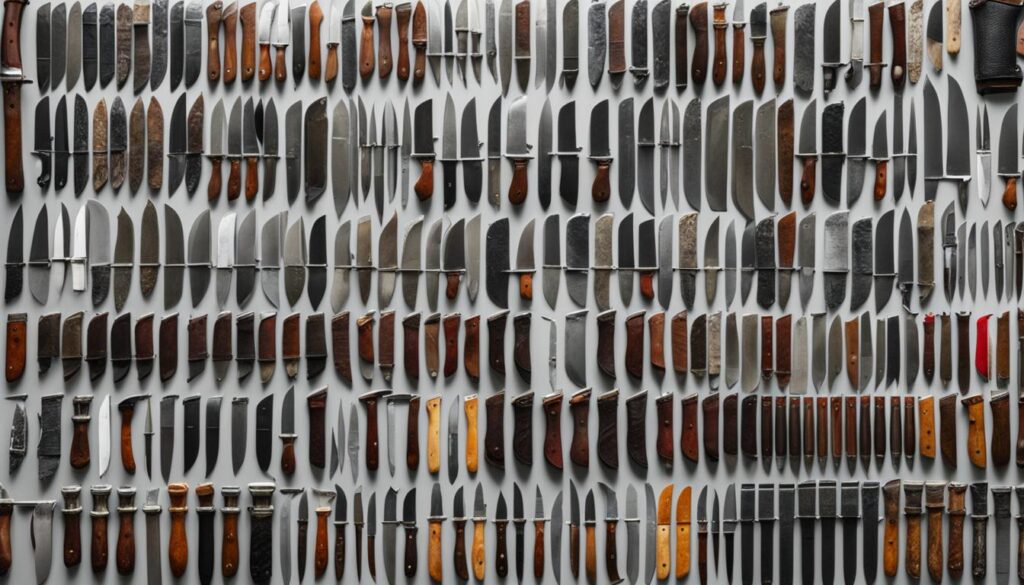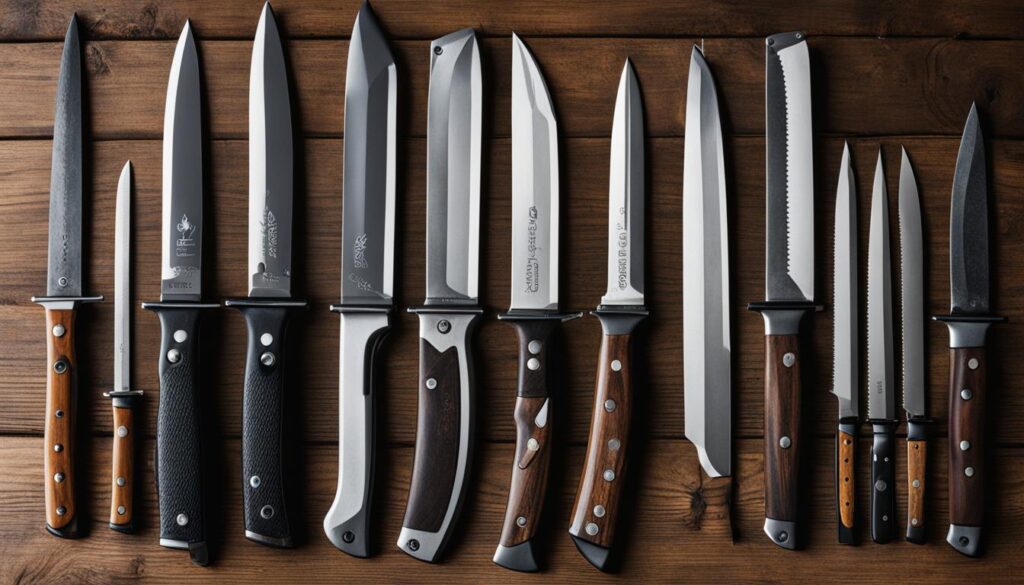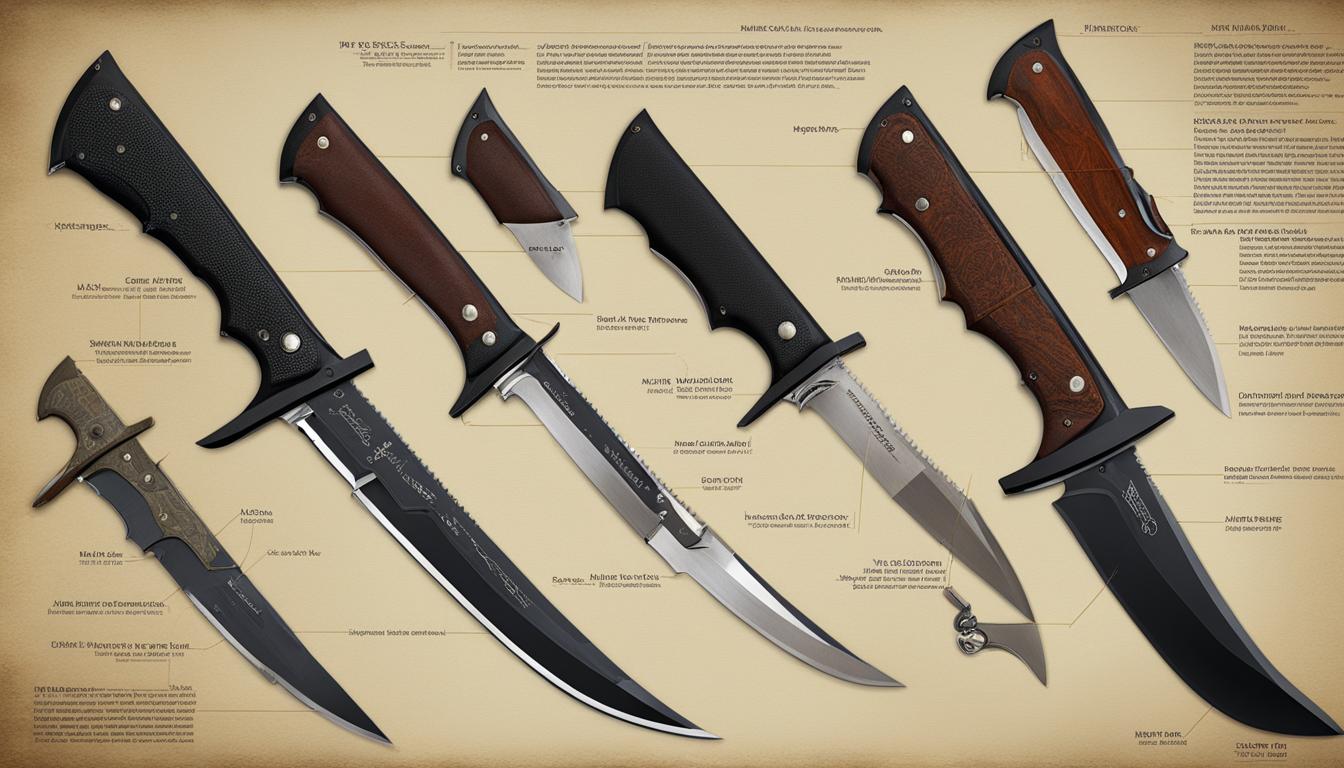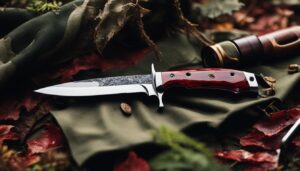Welcome to my comprehensive guide on understanding legal hunting knife definitions. Whether you are an avid hunter or simply interested in the laws surrounding hunting tools, this article will provide you with valuable insights. It is essential to familiarize yourself with the legalities to ensure compliance with local regulations while engaging in hunting activities.
Key Takeaways:
- Legal hunting knife definitions vary from state to state in the United States and from country to country internationally.
- Understanding the restrictions and requirements for carrying knives is crucial to avoid any legal issues.
- Consider the intended use of the knife and select an appropriate design that complies with the law.
- Knife legislation may include prohibitions on certain types of knives, restrictions on sale and manufacture, and regulations on carrying knives in specific locations.
- Stay informed and follow the legal guidelines to enjoy hunting safely and responsibly.
Understanding Knife Use and Selection
When it comes to selecting a hunting knife, there are several factors to consider to ensure you choose the right tool for your needs. Understanding the various blade interpretations and authorized knife classifications is essential in making an informed decision.
First, think about how you intend to use the knife. Are you looking for a specialty knife designed for specific tasks such as skinning or cutting branches, or do you prefer a more versatile, general-purpose knife? Specialized knives can offer greater efficiency in their intended tasks, while general-purpose knives provide flexibility for a variety of hunting activities.
Size and blade design are also crucial factors to consider. The size of the knife should align with your personal preference and practical considerations. Fixed blade knives provide sturdiness and durability, making them suitable for heavy-duty tasks. On the other hand, folding knives are more compact and easily carried, offering convenience for everyday use.
Blade design plays a significant role in the knife’s performance. Drop point blades are versatile and suitable for a wide range of hunting tasks, while clip point blades offer better precision and control for delicate cutting maneuvers. Skinning knives, with their curved and thin blades, excel in skinning game animals effectively.
Authorized Knife Classifications
Understanding the authorized knife classifications is crucial for staying compliant with the law. Various jurisdictions may have different requirements and restrictions, so it is essential to familiarize yourself with the specific rules in your area. Here are some common authorized knife classifications:
- Folding Knives: Pocket knives that can be folded and have a blade that locks in place.
- Fixed Blade Knives: Knives with a non-folding blade, usually with a sheath for protection.
- Multi-Tools: Knives that feature additional tools or functions like pliers, screwdrivers, or bottle openers.
- Automatic-Opening Knives: Knives that open with a spring-assisted mechanism, typically with a button or switch.
By considering the permissible blade interpretations and authorized knife classifications, you can make an informed decision when selecting a hunting knife. Remember to always comply with local laws and regulations to ensure a safe and enjoyable hunting experience.
| Knife Type | Description |
|---|---|
| Folding Knives | Pocket knives that can be folded and have a blade that locks in place. |
| Fixed Blade Knives | Knives with a non-folding blade, usually with a sheath for protection. |
| Multi-Tools | Knives that feature additional tools or functions like pliers, screwdrivers, or bottle openers. |
| Automatic-Opening Knives | Knives that open with a spring-assisted mechanism, typically with a button or switch. |
Remember, selecting the right hunting knife is not only about functionality but also adhering to the laws and regulations pertaining to knife ownership and use. By understanding the permissible blade interpretations and authorized knife classifications, you can make an educated choice that ensures both your safety and compliance with the law.
Knife Laws in Different Countries
Knife legislation varies across different countries, with regulations and restrictions differing from one jurisdiction to another. It is essential to be aware of these laws, especially when traveling or hunting abroad. Understanding the legal hunting knife definitions and authorized knife classifications in each country can help ensure compliance and prevent any legal issues. Here is an overview of knife laws in several countries:
Austria
In Austria, knives that are disguised as other objects or equipped with concealed mechanisms are prohibited. However, there are no restrictions on ordinary knives, making them legal to possess and carry.
Belgium
In Belgium, certain knives like switchblades and butterfly knives are prohibited. Local jurisdictions can impose restrictions on carrying knives without a valid reason. It is important to check with local authorities to understand the specific regulations in each area.
Bulgaria
Bulgaria does not have specific laws governing the possession or carrying of knives. However, certain places may prohibit carrying weapons. It is advisable to exercise caution and respect any signs or rules regarding the carrying of knives in public areas.
Canada
Canada prohibits the possession of knives that open automatically, except for individuals who have obtained exemptions from the Royal Canadian Mounted Police. Other types of knives, such as folding knives, can be owned and used as long as they are not carried for unlawful purposes. While there is no specific length restriction, the intent and context of carrying the knife are important factors to consider.
These examples highlight the diverse range of knife laws in different countries. It is crucial to research and familiarize oneself with the specific regulations before traveling or engaging in any hunting activities to ensure compliance and avoid legal complications.

Knife Laws in Canada
When it comes to understanding legal hunting knife definitions in Canada, it is important to be aware of the specific laws and regulations in place. The possession of knives that open automatically, such as switchblades or gravity knives, is generally prohibited. However, it is worth noting that individuals who have been granted exemption by the Royal Canadian Mounted Police may be allowed to possess these knives. Other types of knives, such as folding knives, are generally permitted as long as they are not carried for a purpose dangerous to public peace or for the purpose of committing a criminal offense.
Unlike some jurisdictions, Canada does not have a specific length restriction for carrying knives. Instead, the intent and context in which the knife is carried become important factors in determining whether it is lawful or not. It is essential to understand that the import and export of prohibited weapons, including certain types of knives, are strictly regulated and enforced by the Canada Border Services Agency.
“The possession of knives that open automatically is generally prohibited in Canada, but folding knives are generally permitted as long as they are not carried for a purpose dangerous to public peace or for the purpose of committing a criminal offense.”
It is important for hunters and knife enthusiasts in Canada to familiarize themselves with these laws to avoid any legal issues. By understanding the legal hunting knife definitions and abiding by the regulations, individuals can enjoy their hunting activities safely and responsibly.


Table: Comparison of Knife Laws in Canada and the United States
| Canada | United States | |
|---|---|---|
| Automatic-Opening Knives | Generally prohibited, except for certain exemptions | Regulated at the state level, some states allow possession and carry with restrictions |
| Folding Knives | Generally permitted, as long as not carried for dangerous purposes or criminal offenses | Allowed with varying restrictions and limitations depending on the state |
| Blade Length Restrictions | No specific length restriction, context and intent considered | Vary by state, some have blade length limits for concealed carry |
| Import and Export Regulations | Strictly regulated and enforced by the Canada Border Services Agency | Regulated by federal agencies like the Bureau of Alcohol, Tobacco, Firearms, and Explosives (ATF) |
Table: A comparison of knife laws in Canada and the United States shows some similarities and differences in the regulations governing the possession and carry of knives. While both countries have restrictions on automatic-opening knives, the specific laws vary. Folding knives are generally permitted in both countries, but there may be differences in the restrictions and limitations imposed at the state or provincial level. Blade length restrictions exist in some states in the United States, while Canada does not have a specific length restriction but considers intent and context. Import and export regulations are strictly enforced in both countries to control the movement of prohibited weapons.
Conclusion
Understanding legal hunting knife definitions is essential for hunters to ensure compliance with local laws and regulations. Knife legislation can vary from state to state in the United States and from country to country internationally, so it is crucial to be aware of the specific laws in your jurisdiction to avoid any legal issues.
When selecting a hunting knife, it is important to consider its intended use and choose the appropriate design. Factors such as size, blade material, handle material, and blade design should be taken into account. By selecting the right hunting tool, you can enhance your hunting experience and ensure practicality in various hunting tasks.
Being informed and following the legal guidelines for carrying knives is also important. Some states and countries have restrictions on the types of knives that can be carried in public, while others may have exceptions for specific purposes like hunting or work-related activities. By understanding the restrictions and requirements, you can enjoy hunting safely and responsibly.
In conclusion, by staying knowledgeable about legal hunting knife definitions and adhering to the laws and regulations in your jurisdiction, you can ensure a lawful and enjoyable hunting experience. Remember to always prioritize safety and responsibility while hunting, and respect the laws and regulations set forth for the use and possession of hunting knives.
FAQ
Are there restrictions on carrying knives in all states in the United States?
No, knife laws can vary from state to state. It is important to check the specific laws in your state.
What information is provided in the summaries of knife laws by the American Knife & Tool Institute?
The summaries include information on prohibited knives, restrictions on sale and manufacture, and regulations on carrying knives.
Can certain individuals and activities be exempt from knife prohibitions?
Yes, certain categories of individuals and activities may be exempt from knife prohibitions. It is important to check the specific laws in your state.
Are there restrictions on carrying knives in public in other countries?
Yes, knife legislation varies in different countries. Some countries have strict regulations, while others may have exceptions for hunting and work-related purposes.
What types of knives are generally allowed in Canada?
Folding knives are generally allowed in Canada, but the possession of knives that open automatically is prohibited.
Is there a specific length restriction for carrying knives in Canada?
There is no specific length restriction, but intent and context are important factors in determining whether carrying a knife is legal.
Are there restrictions on importing and exporting prohibited weapons in Canada?
Yes, import and export of prohibited weapons, including certain types of knives, are strictly regulated and enforced by the Canada Border Services Agency.
Why is it important to understand legal hunting knife definitions?
Understanding legal hunting knife definitions is crucial to ensure compliance with local laws while hunting and to avoid any legal issues.





